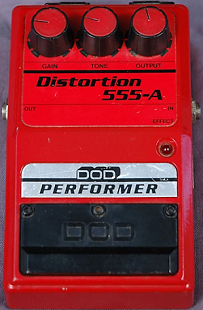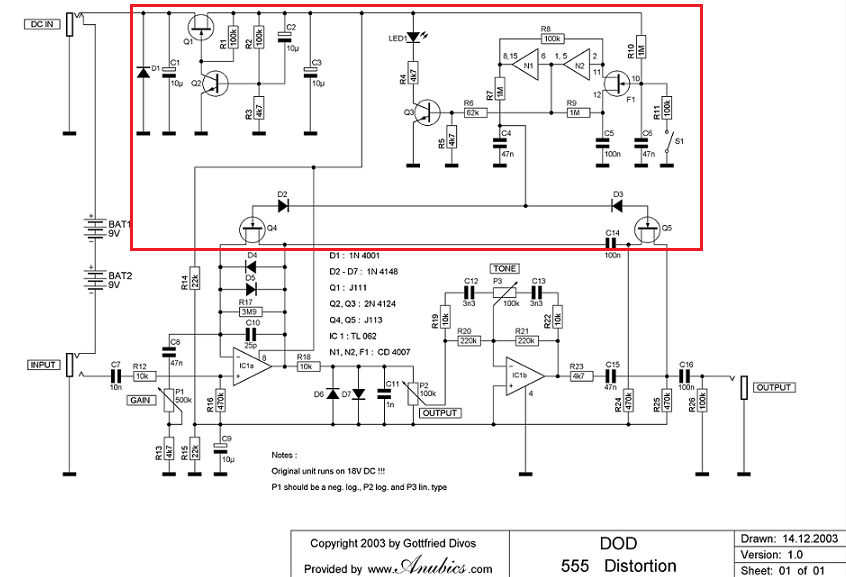Distortion 555-A
The DOD "Perfomer Series" Distortion 555-A. This is pretty much a stinker of a pedal. There's nothing about it that we can point to as redeeming. Well, that's not true. The font on the pedal where it says "Distortion 555-A" is handsome. DOD made another version of this pedal in a grey colored-enclosure called the "555" without the "-A" designation. We believe that the 555-A came after the 555.
The way this pedal sounds is so inferior that it made us laugh after having heard it.
The battery door was poorly designed. many, if not most, examples of this pedal that you can find "in the wild" will have their battery doors missing. It also doesn't help that while this pedal was also sold with its own AC adapter, that adapter itself is so unusual that for whatever reason, people discarded or lost them. It's an AC adapter that's incredibly difficult to find.
The DOD Distortion 555-A stopped being made a long time ago.
- Thermionic Studios has one (1) DOD Distortion 555-A available for rental
Controls

- Knob 1 - "Gain": Sets the level of distortion of the pedal.
- Knob 2 - "Tone": Sets the brightness of the pedal. Fully counterclockwise is dark. Fully clockwise is bright.
- Knob 3 - "Output": Sets the volume or output level of the pedal.
- Footswitch 1 - "On/Off": This plate turns the effect on and off in the signal chain.
There is a single input and a single output.
If using 9-volt batteries, to prevent them from being drained while pedal is not in use, be sure to remove any plug from the input jack.
Bypass: Buffered
All DOD pedals from this period had a buffered bypass - this generation of pedals is considered to have some "tone suck".
General Information
We obtained this pedal simply for the perversely fond memories of the first Distortion 555-A that we had access to while young and stupid. This pedal would be the impetus for the Bad Device Chain Challenge. Back in the 1980s when this pedal was first introduced, it ate batteries like they were snacks. If you want to spend a lot of money on batteries, use this pedal in battery mode, otherwise buy an 18-volt AC power adapter.
18-Volt Oddities
Even "back in the day" when pedal companies were "fighting it out" over different AC adapter plugs-and-jacks for their pedals, this particular line of DOD pedals was unique in that it not only does it use 18 volts for power, but even more uniquely (oddly, actually), it uses a standard 1/4-inch instrument-cable style plug on the end of the AC adapter that came with the pedal. We can think of no other pedal series that uses an AC adapter power-supply that also uses an odd 1/4" instrument-style plug.
As mentioned above, despite the fact that the correct AC adapters came in the same package as the Perfomer series pedals, today, the number of AC adapters available for these pedals are, for bizarre reasons, fewer than the number of pedals. Since these pedals tend to chew through batteries (two at a time!), and if you don't have an appropriate AC adapter, it's entirely possible to wire/solder up your own 1/4" AC adapter plug - just be sure you know what you're doing.
Of course, you could also use two 9-volt batteries.
"Flap" Footswitch
These old(-ish) DOD pedals with the "flap"-style footswitch are not always the most cooperative in terms of consistently working. It's not that the switches actually fail or break terribly often because they actually don't "fail" or "break" terribly often. What they have a reputation for is that they do not consistently toggle between "active" and "bypass" when stomped.
This is actually kind of weird and takes some getting used to. Again, it's not because the pedal is "broken"; it's because the switch doesn't seem like it was designed so well in this generation of DOD pedals.
What we mean by "wasn't designed so well" is that you could depress the footswitch on this pedal with reasonable force and yet fail to cause the footswitch to toggle on or off. Alternatively, it's also possible to touch the pedal with a feather's weight of pressure and trigger it just fine. Now, combine this fact with the other, very real issue of a lack of tactile feedback when switching the pedal on or off and it makes for a pedal that takes some familiarity to reliably operate.
What's the tactile feedback issue, you ask? It's this: If you step on the pedal to toggle it on or off, there's no click like button switches. There's no give, like Boss flap-style switches. There's very little to be felt except your own knowing that you've stepped on the pedal. In other words, there's no sense of movement, or tactile feedback to inform you that you've successfully switched the function of the pedal. You actually have to look at the LED to verify that you've turned it on or off. So with the switching being inconsistent, combined with the lack of tactile feedback can create a problem for players. Please note now that you've been warned that this isn't the most cooperative of pedals to operate.
Pedal Manual
There may have been a pedal manual that came in the box with this pedal. However, this pedal and all others like it that still exist from the early 1980s all seem to have lost the boxes that they were sold in. Given that these pedals were made in the 1980s and given that there was no Internet in the 1980s, we doubt that there is any manual, especially a digital manual, that can be associated with this pedal.
Given that this pedal is a candidate for the Bad Device Chain Challenge we're not under any pressing compulsion to buy up every last available Distortion 555-A with the hopes of finding the associated box and printed manual. It just is what it is...
Phase Inversion: Yes
We have found a schematic! We are shocked at our good fortune! See below!
This distortion pedal inverts phase.
| Schematic ID | Electronic Part | Action | Phase State |
|---|---|---|---|
| IC1a | TL062 | Does not invert | Original |
| IC1b | TL062 | Inverts | Inverted |
Schematic
23-Oct-2018: WE FOUND A SCHEMATIC!
NOTE: The only part that really matters is the portion of the schematic is the portion that is NOT ENCLOSED by the red box. The enclosed portion is the electronic switching. The rest of the schematic is the distortion circuit.
Artists
We are currently unaware of any artists actively using the pedal now, or who have in the past.
- Additional Sources
